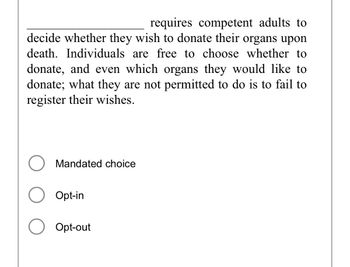Question

Transcribed Image Text:The text provided discusses a policy regarding organ donation decisions. In this policy, competent adults are required to decide whether they wish to donate their organs upon death. They can freely choose whether to donate and which organs they would like to donate. However, they must register their wishes, and failing to do so is not permitted.
Options presented for filling in the blank are:
- Mandated choice
- Opt-in
- Opt-out
The image does not contain any graphs or diagrams, only text and selectable options.
Expert Solution
arrow_forward
Step 1: Introduce organ donation
Organ donation is when a person allows an organ of theirs to be removed. This is legal process by consent while the donor is alive or after death with the assent of the next of the kin.
Common organs that are donated are kidney, heart, liver, pancreas, bones, eyes etc.
The purpose of the organ donation is a transplant can save or transform the life of a person. One organ can save up to 7 lives and help many more through eye and tissue donation.
Step by stepSolved in 5 steps

Knowledge Booster
Similar questions
- what particular group of people does American public health Association service/helps ?arrow_forwardTelehealth and mHealth Telehealth has been in use since the 1950s. It is the original mHealth service, consisting of a traditional provider/patient encounter using audio and video connections over a distance. Telehealth could be as simple as two health professionals discussing a case over the telephone or as sophisticated as doing robotic surgery between facilities at different ends of the globe. Read the following case study and answer the related questions to explore the importance of telehealth and mHealth. Read the case below and answer the questions to the right. Mr. Burton was admitted to the largest teaching facility in the city due to a pain in his stomach for the last two weeks. The hospital is well known for the specialists who practice there. Mr. Burton's attending physician, Dr. Mason, examined him but was unable to determine what was causing the pain. Dr. Mason wanted to ask Dr. Pullin, a specialist in gastrointestinal disorders, to consult on the case. Dr. Pullin is…arrow_forwardRead Chapter 4 of the textbook, Integrated Electronic Health Records. Answer the following questions to the best of your ability using complete sentences. (Answer each question with a minimum of 75 words). What is the purpose of the master patient index within an EHR system? What demographic information do you think needs to be included in the master patient index? Explain your answer. Reply to at least two (2) classmates, with a minimum of 75 words each postarrow_forward
- Do asap Surgery decreases calorie needs of pediatric patient Group of answer choices True False!arrow_forwardAround the world, organ donation policies vary greatly. With an system, people have to sign up to register to donate their organs after death. In an system, organ donation will occur automatically unless a specific request is made before death for organs not to be taken or in some countries, the family objects. Opt-out; Opt-in O Opt-out; Opt-out Opt-in; Opt-out O Opt-in; Opt-inarrow_forwardIt is not all of the above (I already tried that).arrow_forward
- Which of the following is an element of the 'health empowerment' model of communications with consumers/clients of healthcare services that is consistent with health promotion? The objective of patient education is to remedy deficits in information and promote compliance O The patient is an expert in knowing her/his own needs The role of the patient is to be an active participant in their healthcare The patient wants the health worker to make decisions; the patient needs simple informationarrow_forwardCMS requires that a hospital that participates in the Medicare and Medicaid programs follow the _____. Group of answer choices Medical bylaws of the healthcare organization Licensure standards Conditions of Participation Accreditation organizationarrow_forwardWhich country does not offer compulsory private health insurance Switzerland Japan Germany Swedenarrow_forward
arrow_back_ios
arrow_forward_ios